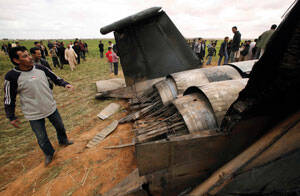Air strikes launched by a coalition that included the United States, France and Great Britain have turned back an advance of forces loyal to Col. Muammar el-Qaddafi near Benghazi, Libya, that seemed on the verge of obliterating the North African state’s nascent rebellion. But the matter of what comes after the conclusion of an air campaign intended to precede the enforcement of a no-fly zone over Libya has quickly become a political football in the United States. Critics from both sides of the aisle charge that the Obama administration has entangled the nation in a third military adventure with no clear end in sight.
David Cortright, director of policy studies at the University of Notre Dame’s Kroc Institute for International Peace Studies, said analyzing the coalition’s use of force through Catholic just war principles “yields a mixed opinion.” The campaign was launched with appropriate multilateral authority that included endorsement by the Arab League and approval from the U.N. Security Council. And the air strikes, he said, have prevented a threatened “mass killing” of noncombatants. “The cause of protecting civilians is certainly just,” said Cortright. Where the decision to intervene breaks down, he said, is on the tradition’s prohibition against the use of force when the “probability of success” is doubtful. Regarding the current campaign against Qaddaffi, “No end game is in sight,” said Cortright. “And it is not clear how the use of military force will contribute to a stable political settlement.”
The dangers for the United States, he warned, are huge. “If the campaign does not produce quick results, the intervening forces will face pressures to escalate,” Cortright said. “If the operation falters and the rebels are not able to oust the regime, the U.S. and its allies will be blamed for a failure that was not theirs in the making.”
Cortright said that other options remain for saving Libyan lives, including the establishment by the Security Council of protected humanitarian corridors near Libya’s borders. “This would help the delivery of humanitarian aid and would provide a location where defectors could safely qualify for amnesty from future criminal prosecution.” He said the Obama administration could also work to strengthen newly imposed sanctions targeted against the regime.
Church leaders from the region were more critical of the decision to use force. Bishop Giovanni Innocenzo Martinelli, O.F.M., apostolic vicar of Tripoli and president of Caritas Libya, said on March 21 that he was shocked by the coalition campaign, which “has proved devastating for civilians and risky on the level of political consequences.” He said undoubtedly there was a serious risk of “collateral damages.”
The archbishop said, “I cannot approve this type of violence against what until yesterday was a friendly nation, particularly as far as Italy is concerned.” Bishop Martinelli said the coalition campaign has seriously complicated Caritas Libya’s efforts to assist 2,500 Eritrean migrants still in Libya. “Our hope is to soon be able to transfer them toward the border with Tunisia.”








